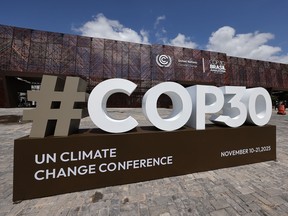
Article content
As politicians prepare to jet into Belém, Brazil, for the 30th annual UN climate meeting, philanthropist Bill Gates has provided a straightforward insight: climate summits like COP30 should prioritize what truly improves human lives, and not just chase reductions in emissions or temperatures. His point is both refreshingly overdue and, frankly, obvious common sense.
THIS CONTENT IS RESERVED FOR SUBSCRIBERS ONLY
Subscribe now to read the latest news in your city and across Canada.
- Exclusive articles from Barbara Shecter, Joe O'Connor, Gabriel Friedman, and others.
- Daily content from Financial Times, the world's leading global business publication.
- Unlimited online access to read articles from Financial Post, National Post and 15 news sites across Canada with one account.
- National Post ePaper, an electronic replica of the print edition to view on any device, share and comment on.
- Daily puzzles, including the New York Times Crossword.
SUBSCRIBE TO UNLOCK MORE ARTICLES
Subscribe now to read the latest news in your city and across Canada.
- Exclusive articles from Barbara Shecter, Joe O'Connor, Gabriel Friedman and others.
- Daily content from Financial Times, the world's leading global business publication.
- Unlimited online access to read articles from Financial Post, National Post and 15 news sites across Canada with one account.
- National Post ePaper, an electronic replica of the print edition to view on any device, share and comment on.
- Daily puzzles, including the New York Times Crossword.
REGISTER / SIGN IN TO UNLOCK MORE ARTICLES
Create an account or sign in to continue with your reading experience.
- Access articles from across Canada with one account.
- Share your thoughts and join the conversation in the comments.
- Enjoy additional articles per month.
- Get email updates from your favourite authors.
THIS ARTICLE IS FREE TO READ REGISTER TO UNLOCK.
Create an account or sign in to continue with your reading experience.
- Access articles from across Canada with one account
- Share your thoughts and join the conversation in the comments
- Enjoy additional articles per month
- Get email updates from your favourite authors
Sign In or Create an Account
or
Article content
Article content
I have long argued that policy-makers should always ask: What’s the smartest way to do the most good with limited resources? For billions of people in the developing world, tackling immediate challenges like poverty and disease outweighs chasing distant temperature goals.
Article content
Article content
By signing up you consent to receive the above newsletter from Postmedia Network Inc.
Article content
In poor countries, parents are not kept awake by concern about achieving a 0.1°C temperature reduction over a century. They worry whether their children will survive a bout with malaria or get a decent education. As Gates points out, “the biggest problems are poverty and disease, just as they always have been.” Every year, more than 7.5 million people in poorer countries die from illnesses that could be prevented or managed very cheaply. Smart investments in health, nutrition and education could save over four million people every year, while also building growth and resilience for the future.
Article content
Gates’ common-sense message is at the crest of a growing global shift in thinking. For years, no departure from dogmatic climate conformism has been tolerated. Making drastic emissions cuts at any cost has been the paramount policy goal. This extremist message has been repeated ad nauseam by the United Nations’ secretary-general, numberless politicians and an army of hectoring celebrities. Anyone questioning the supremacy of the climate threat or expressing skepticism at the costly policies required has been derided as a “climate denier.”
Article content
Article content
Suddenly, pragmatism and nuanced thinking are back in fashion. Prime Minister Mark Carney — who warned a decade ago that potential climate catastrophe meant fossil fuel reserves could be “unburnable” — is fast-tracking the construction of an LNG export terminal and promising to “transform our country into an energy superpower.” In the U.S., Democratic Senator Chris Coons says climate is “not a top three issue right now.” Even the green-leaning British and German governments are talking about the need to inject some economics into climate and energy policy.
Article content
Article content
It is time to move beyond the doomsday narratives that have dominated the climate discussion in recent years. Climate change is a real problem, but it is — literally — not the end of the world. If it’s not addressed, climate economicsshows that it might shave two to three per cent off global GDP by 2100 — meaning we’ll be 435 per cent richer instead of 450 per cent. Climate is one issue among many, not an apocalypse that eclipses everything else.
Article content
And yet the same old activists are repeating their well-worn arguments. First, the notion that climate spending is not crowding out efforts to tackle poverty. This idea is pushed by climate professor Michael Oppenheimer, who claims Gates sets up a “false dichotomy.” But anyone living in the real world knows money can’t be spent twice. By their own proud admission, the world’s multilateral development banks — international organizations funded largely by taxpayers to help the world’s poorest countries — devoted an astonishing US$137 billion to climate financing in 2024. That is $137 billion that won’t be spent on preventing disease and hunger.

.jpg) 19 hours ago
3
19 hours ago
3
 English (US)
English (US)